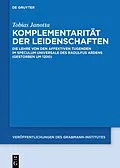The Speculum universale by Radulfus Ardens is considered the most comprehensive sketch of twelfth-century theological ethics. Special attention must be paid to the concept of complementary virtues (which the author developed largely independently), according to which virtue cannot stand on its own and must constantly be set in relation to its opposite. The significance of this principle is drawn out by looking at examples from books 11 and 12.
Autorentext
Tobias Janotta, Lehrstuhl für Moraltheologie, Institut für systematische Theologie, Fakultät für katholische Theologie, Julius-Maximilians-Universität Würzburg, Deutschland.
Zusammenfassung
In this series, the Grabmann Institute publishes new editions and studies that make a valuable contribution to the Institute's research focus. In these publications many of which originate from within the Institute a primary focus is placed on medieval theology and philosophy, but the chronological arc spans from the end of antiquity to the modern era. The series' historical perspectives are undergirded by a systematic approach. The published volumes address topics in all areas of medieval theology and philosophy and present outstanding and lesser known theologians and philosophers, their works and impact. Due consideration is also given to aspects of mysticism and spirituality as they essentially pertain to medieval theology and philosophy.
Link to the Martin-Grabmann-Forschungsinstitut für Mittelalterliche Theologie und Philosophie.
